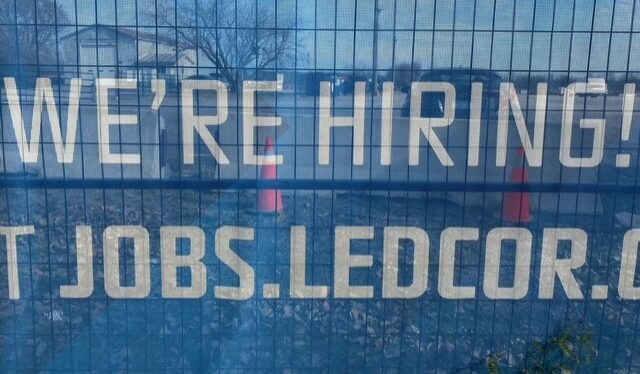
Signs like this one on Wallbridge-Loyalist Road are a common sight around the Belleville area as many employers are desperate for workers. Photo by Jordan Mills, QNet News
By Jordan Mills
BELLEVILLE – Help-wanted signs can be seen throughout Belleville and point to a common theme being echoed by many employers in the region: there aren’t enough workers.
All sectors are affected by the shortage, but Chris King, chief executive officer of the Quinte Economic Development Commission, says manufacturing has been particularly hard hit.
“Manufacturing operations make up a big part of our economy,” King said in an interview with QNet News Wednesday. “Over half of our economic output is through manufacturing and it is the largest employment sector … When there is a shortage in manufacturing, it impacts the entire economy here.”
Products manufactured in this region are typically sold elsewhere, bring new dollars back to this area, said King. That in turn has an effect on other sectors, like retail and construction.
“I don’t have a rough number to give, but I haven’t talked to a single employer that isn’t experiencing some kind of shortage,” he said, although he added that “premium employers that are able to pay great wages and offer great benefits are impacted less.”
There are many reasons for the labour shortage, but the two largest factors are an aging workforce and a poorly timed pandemic, King said.
Audio PlayerOne program that aims to get more workers into the local manufacturing industry is Elevate Plus, which is based at Loyalist College. It helps prepare people interested in working in manufacturing and guarantees a job as soon as participants finish the program. More than 200 people have graduated since the program began eight years ago, King said.

Community Employment Services is a program that helps to find work for those in the Belleville and Bancroft areas. CES is fully funded by the government of Ontario. Phot by Jordan Mills, QNet News.
Belleville Community Employment Services, an agency that matches employers and workers and is also affiliated with Loyalist College, is also feeling the effects of the worker shortage. Joanne Leith, a site co-ordinator at CES, says fewer people are coming into the office looking for work and even the agency’s own staff is shorthanded.
“I’ve been doing this for awhile and I’ve never seen so many (help-wanted) signs in front of buildings or on doors,” said Leith. “We have a lot of employers calling us and we do post jobs for them. I truly believe it is not overblown and there is a (worker) shortage.”
Because of the shortage, Leith said, employers are hiring less-experienced workers who need extra training.
“We are finding employers a little more open to hiring someone who could be trained in certain areas and maybe doesn’t hit exactly everything they’re looking for. That is an area where we can step in and find that potential match.”
 Print This Post
Print This Post






